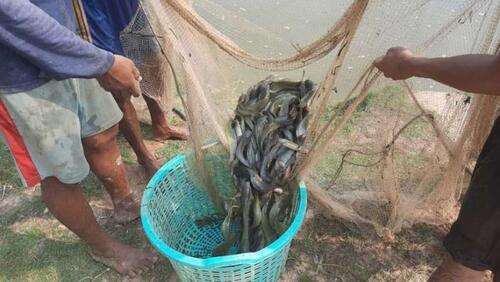Kampong Cham Dry-fish Firm Eager to Scale Up

Kampong Cham Dry-fish Firm Eager to Scale Up
On October 3rd, 2021, the Phnom Penh Post published an article on the success of the Thoeun Srey Ny aquaculture and fisheries processing business located in the Chhor Thmei village of Cambodia’s western Kampong Province. The business operates under the Commercialisation of Aquaculture for Sustainable Trade (Cast) Cambodia program which aims to increase the production of high-demand fish species for the domestic market and grow Cambodia’s aquaculture industry. The program is backed by a $17.1 million from the U.S. Department of Agriculture. The Cambodian Minister of Agriculture, Veng Sakhon, personally congratulated Lim Ponny, the head of the business on Facebook, saying that her achievements stem from “good cooperation between the US Department of Agriculture and the Ministry of Agriculture… of the Kingdom of Cambodia.” Sakhon also shared a video in which Ponny explains the inner workings of her business in which over 500 kg of freshwater fish are processed each day and often dried into trei ngiet or fermented in prahok, staples of Cambodian cuisine. Ponny’s business now employs 15 full time workers and she is working on documents to export her products.
The Tonle Sap, Cambodia’s largest freshwater lake covering an area of 3,000 to 16,000 km2 depending on the time of year, is the heart of Cambodia’s food production. The journey between the Tonle Sap and the Mekong River is the largest migration of freshwater fish in the world. Freshwater fish constitute three quarters of the total animal protein intake in Cambodia, three quarters of which come from the Tonle Sap alone. Fishing yields from the Tonle Sap have decreased in recent years due to low inflow from the Mekong river and tributaries in the early wet season of 2020 and overfishing, which threatens the livelihoods of many Cambodians, especially those living in the Tonle Sap’s floating villages. Overfishing may be attributed to rising populations along the coast of the Tonle Sap and in floating villages as evidenced by a comparison of Cambodian census data from 2008 and 2019. However, the rise in large scale fishing operations also plays a role.
CAST Cambodia is ostensibly a response to this crisis. The program focuses on promoting access to “seed” fish to rehabilitate the fish population. The program also promises to promote soybean agriculture as an alternative protein source to improve sustainability in the aquaculture sector. However, the program also aims to turn Cambodia into an international consumer and supplier of aquaculture products. In the face of the global climate crisis, the CAST Cambodia program is a strategic U.S. investment which effectively secures a supply of freshwater fish through future trade with Cambodia. While the CAST Cambodia program works directly with local fisheries to spread knowledge of sustainable fishing practices, it is inevitable that the increased commercialization and regulation of the industry will alter the social dynamics of fishing villages along the Tonle Sap. For instance, there may be a shift from family businesses to large-scale fishing operations.
Sources